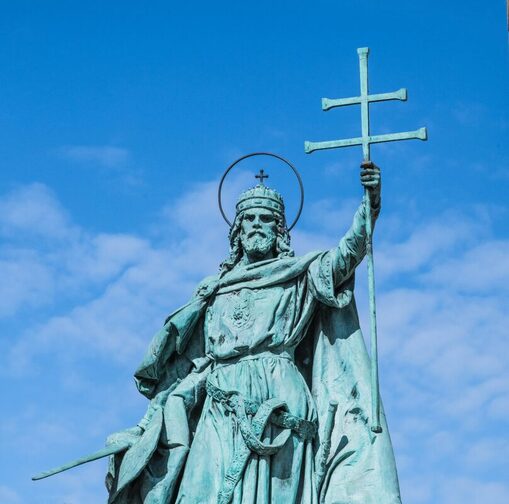Excerpted from a Hungary Today article describing the August 20th national holiday (errors left intact):
August 20th, the biggest national holiday of the country, is founding day of the Christian Hungarian state, as well as the feast of St. Stephen and the “New Bread” in Hungary. The founder of the Hungarian Kingdom and Hungarian statehood, King Stephen I, under whose rule the Christianization of the country started, died on August 15, 1038, and was only declared a saint after the conquest of Buda (1686). So, why do we celebrate the founding of the state on August 20th?
Stephen I’s father, Géza, was the last “fejedelem” (essentially a tribal version of a king). From 972 until his death, Géza established European customs in the country to pave the way for his preferred heir, his son, Vajk. He invited missionaries to the country, established a convent, and ensured international recognition for the country by having his son marry the Bavarian Prince, Henrik II.’s daughter, Gizella.
Vajk is the pagan name of Saint Stephen. After his father died, he needed to ensure his right to the throne. Even though Géza used primogeniture (the king’s oldest son has the right to rule) to justify Vajk’s claim to be king of Hungary, the half-tribal society failed to adopt this custom easily, resulting in a destructive war between Vajk and Koppány, the second of whom claimed the throne based on the traditional Hungarian practice of seniority (the oldest man in the family is the heir). The future Saint Stephen defeated him and punished all his followers.
Upon successfully securing his claim to the throne, he began the actual work of managing the kingdom. After being baptized, he was crowned on the first of January, 1001 (or possibly the 25th of December, 1000), as Stephen I, with a crown that is said to have been a gift from Pope Silvester II. This present was a depiction of the Pope’s approval of Hungary and Stephen.
In 1001, he established an archdiocese in Esztergom – which was essential to the independence of Hungary. This guaranteed that the Hungarian Catholic Church would be independent of the German one. It was during this time that the first monasteries and abbeys were being formed, these were crucially important in providing missionaries and priests for the nascent Hungarian Church. He made two codes of law, in which he protected the rights of the Church and encouraged the worship of Christianity, and punished those who refused to practice it. Ten bishoprics were established, of which two were archbishoprics. Cathedral chapters were formed, where clerics made religious certificates and official documents. This helped spread literacy in Hungary.
Aside from establishing Hungary as an independent Christian kingdom, it is important to mention how he began a massive reform of Hungarian tribal society. The people of the newly established state were judged by new laws, needed to pay new taxes and worship a new God. Priests and religious workers became the elite of the society from this point onward – in the future, they would even have the right to have a say in legislation. Saint Stephen also aimed to have good relations with the surrounding countries to prevent this process of reform from being disrupted by war.
Moreover, Stephen put great importance on raising an heir – his son was educated and brought up by a German missionary, (Saint) Gellért, who later lost his life to pagans. This also shows how, despite Stephen trying his hardest, the process of Hungarian becoming entirely Christian was going to be a long one. Unfortunately, Stephen’s son, Imre (Emeric), died at a young age, which resulted in different groups fighting for the throne after Stephen’s death.


 RSS Feed
RSS Feed

